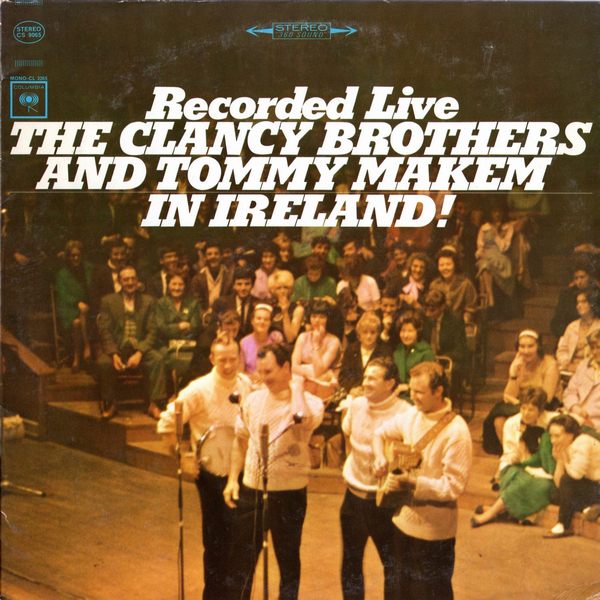

 |



|




|
Sleeve Notes
The Clancy Brothers and Tommy Makem have successfully subverted just about every one of the rules that supposedly assure success in the folk-singing business. To begin with, they are the real article. Some folk singers, including some of the better known ones, have never gotten closer to the source of their material than scratchy field recordings that are regarded as gospel. Not this group. As one reviewer put it: "They look and sing like men who discovered their voices in a County Tipperary pub, with their mitts firmly gripping pints of Guinness."
That's part of it. Another part is a complete lack of austerity. Some folk performers come on in concert with a solemnity that suggests a cross between a lecture in advanced anthropology and a holy ritual. You don't have to listen to much more than thirty seconds of this record to figure out that the Clancys are having a wonderful time for themselves, and are expert in communicating that feeling to the audience.
Which is not to say that they don't take themselves seriously. There is a fine and often misunderstood line between being serious and being solemn; the Clancys have mastered that distinction beautifully. Too often, as you must have noticed, any folk group that is not all solemnity sometimes shows a tendency to mock its own material, to show that it is far more sophisticated than the songs being sung. Not the Clancys. They believe what they are singing about, they love what they are singing about, and the great fun they have is never at the expense of their material.
For these and other reasons, it is unusually significant that this album was recorded where it was. Fully one third of all the record albums sold in Ireland are LP's by the Clancy Brothers and Tommy Makem. You can't find much better evidence of being the real article than that. Since all of the Clancy material is either Irish folk songs or, like The Curlew's Song, songs that the boys have developed out of research into Irish folklore, music and history, they decided to return to the source of their work and repay the debt by conducting a concert tour of Ireland.
This album is a souvenir of that tour, and is the first stereo album ever recorded on the Ould Sod. It was made on the evenings of August 21 and 22, 1964, on the stage of Ulster Hall in Belfast. Tom Wilson, the Columbia Records producer who went along on the trip for this album, says it is a "live and lively" hall. It is the scene of everything from boxing matches to rock-and-roll shows, and is unusual in that, unlike many auditoriums, it has a second section of high, canted seats behind the performers. The Clancys were especially interested in seeing how a recording would turn out that had the special enthusiasm an Irish audience would have for their work. At Ulster Hall, with the boys literally surrounded by their admirers, the results exceeded all expectations. It is axiomatic that a group like the Clancy Brothers and Tommy Makem would perform more successfully before a live audience than in a recording studio, and the special circumstances of this record make that proposition more true than ever. To insure complete authenticity, there was even an Irish engineer: Captain William Stapleton, Managing Director of Silverpine Studios, Ltd., of Dublin.
So here you have the Clancys back home. The three brothers — Liam, Tom and Pat — are from Tipperary, as the reviewer mentioned above suspected, and Tommy Makem is from the North. They were obviously having a wonderful time — during the moment on Beggar Man when the music seems to fade away, Tommy Makem was dancing a jig onstage.
Possibly — maybe even probably — you have heard the Clancys do some of these numbers before. But never like this, never in such circumstances. I shall probably never tire of Weila Wallia, which may be the world's most unsentimental children's song. Or the charming lilt of Ar Fol Lol La Lo. Or Maid of Fife, perhaps better known in this country as "Pretty Peggy-O." But the number here that undoubtedly deserves special mention is Lament for Brendan Behan. The Clancys knew and had an affinity for the late playwright: their concerts and recordings are replete with references to him, and they have a magnificent version of Behan's prison song, "The Old Triangle." So it is especially fitting that, on their return to Ireland, they should sing this tribute to one of Ireland's great writers. Now, of course, Seán O'Casey is gone, too, the giant of the generation before Behan's. They will both be missed. And speaking of that, there is a swift return to joy after this song — and an even swifter dissection of another Irish author, James Joyce — which should not be missed on New Finnegan's Wake.
It must have been wonderful to be there on those joyous nights in Ulster Hall with the Clancy Brothers and Tommy Makem — but you can't have everything; and we are fortunate to have this live recording to tell us what it was like. It was something very special, just as this album is.
— Joe Goldberg